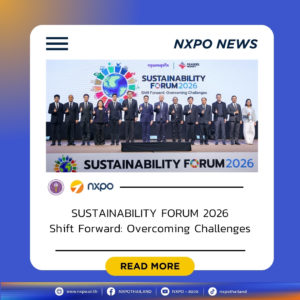
In 2020, NXPO’s work focused on driving the higher education, science, research and innovation (HESRI) policy and HESRI system reform that would enable the exploitation of HESRI in all sectors for long-term national development as well as short-term recovery from the pandemic. The work in 2020 can be categorized in 6 areas and this article focuses on NXPO’s role in driving key agenda supporting the national strategy.
NXPO supports the national strategy by creating innovative solutions responding to the needs of the country; transforming the country to an innovation-driven economy; strengthening an innovation ecosystem with the targets of 1,000 one-billion-THB-revenue IDEs (innovation-driven enterprises) and 2% GERD (gross expenditure on R&D) by 2027; establishing the future industry and reducing social inequality with targeted poverty eradication. Highlights of this mission in 2020 include:
- IDE Development Platform. NXPO worked with the IDE Center of the University of the Thai Chamber of Commerce implementing Entrepreneurship Acceleration Program by applying the concept of MIT Regional Entrepreneurship Acceleration Program (MIT REAP). In 2020, the program was implemented in 24 communities with a participation of 205 organizations representing universities, public and private entities. The Entrepreneurship Acceleration Program focuses on setting IDE mindset among stakeholders in the community, identifying community-based problems and developing innovative solutions that are specific to each community. The exercise helps the community establish a long-term platform for IDE development.
- Bio-Circular-Green Economy (BCG) Model. BCG model is a national strategy for sustainable development. Following its release of BCG white paper in 2018, NXPO has initiated funding programs at the Program Management Unit for National Competitiveness Enhancement (PMU-C) to promote BCG. Examples of projects include the establishment of CROs (Clinical Research Organizations), the development of RT-PCR COVID-19 test and the development of industrial-scale xanthone extraction from mangosteen pericarp. NXPO also supported the preparation of “BCG in Action: The New Sustainable Growth Engine” proposal which would serve as the foundation for the implementation.
- Circular Economy (CE). NXPO performed a study and, as a result, introduced a CE model for Thailand. Based on systems research approach, the CE model for Thailand goes beyond waste management and treatment, aiming to revolutionize Thai industry and invigorate the economy with CE. To kick off CE transformation, PMU-C has established four anchor programs: 1) CE Champion for supporting high-impact projects in the private sector; 2) CE Platform for developing solutions for various sectors in the industry 3) CE R&D for funding research and innovation; and 4) CE Citizen for developing awareness and market. In addition, NXPO joined a CE pact made by more than 30 organizations representing public and private enterprises aiming to promote the concept and practices of CE in order to help mitigate climate change and enable sustainable growth. CE white paper is available in Thai language at: https://www.nxpo.or.th/CE.
- Targeted Poverty Eradication. NXPO formulated policy recommendations for HESRI to implement targeted poverty eradication as follows:
- Establish a national committee on poverty eradication responsible for setting policy and framework for targeted poverty eradication, allocating resources and budget, reviewing and unlocking regulations to enable an effective implementation, and monitoring the implementation progress.
- Promote private sector engagement in targeted poverty eradication by introducing incentive measures such as soft loan, tax deduction, and environmental, social and governance (ESG) standards.
- Deploy targeted poverty eradication action plan to organizations under Ministry of Higher Education, Science, Research and Innovation (MHESI) to implement for at least 4 years by setting KPI and criteria in university ranking.
The Program Management Unit for Area-based Development (PMU-A) has provided funding and coordination to universities to collect data, identify poor people, perform root cause analysis in order to create solutions specific to each individual target group by applying suitable knowledge and research. In addition, programs such as upskilling/reskilling program, inclusive innovation, U2T (university to tambon) program have been established to support the implementation. A white paper on “From Poverty toward Prosperity” is available in Thai language at: https://www.nxpo.or.th/Poverty-to-prosperity.
- Knowledge Management System for Social Sciences, Humanities and Arts for National Development. NXPO initiated a system research to design strategy – covering the areas of manpower development, funding system, evaluation and monitoring system – for the development of social sciences, humanities and arts to enable their application for the national development.
- Future Mobility Industry. NXPO performed a study to serve as a basis for policy setting to create a new industry based on Autonomous, Connected, Electric, and Shared (ACES) trends. Recommendations on technology localization were developed into a funding program operated by PMU-C. In addition, NXPO formulated a white paper on future mobility industry providing recommendations on the development of electric vehicle industry and charging stations. The white paper is available in Thai language at: https://www.nxpo.or.th/EV-2020.







